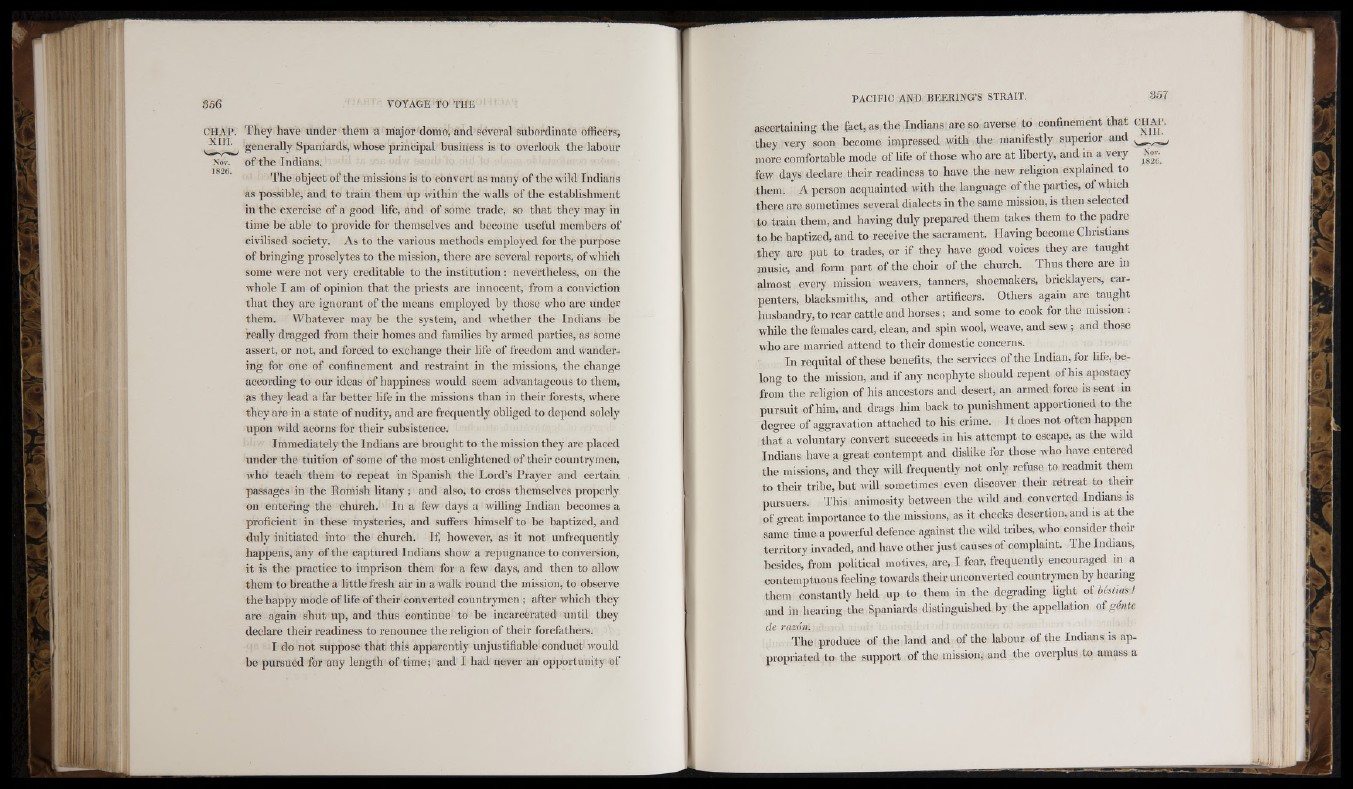
C H A P . They have under them a major domo, and several subordinate officers,
Nov.
1826.
generally Spaniards, whose principal business is to overlook the labour
of the Indians.
The object of the missions is to convert as many of the wild Indians
as possible, and to train them up within the walls of the establishment
in the exercise of a good life, and of some trade, so that they may in
time be able to provide for themselves and become useful members of
civilised society. As to the various methods employed for the purpose
of bringing proselytes to the mission, there are several reports, of which
some were not very creditable to the institution ; nevertheless, on the
whole I am of opinion that the priests are innocent, from a conviction
that they are ignorant of the means employed by those who are under
them. Whatever may be the system, and rvhether the Indians be
really dragged from their homes and families by armed parties, as some
assert, or not, and forced to exchange their life of freedom and wandering
for one of confinement and restraint in the missions, the change
according to our ideas of happiness would seem advantageous to them,
as they lead a far better life in the missions than in their forests, where
they are in a state of nudity, and are frequently obliged to depend solely
upon wild acorns for their subsistence.
Immediately the Indians are brought to the mission they are placed
under the tuition of some of the most enlightened of their countrymen,
who teach them to repeat in Spanish the Lord’s Prayer and certain
passages in the Eomish litany ; and also, to cross themselves properly
on entering the church. In a few days a willing Indian becomes a
proficient in these mysteries, and suffers himself to be baptized, and
duly initiated into the church. If, however, as it not unfrequently
happens, any of the captured Indians show a repugnance to conversion,
it is the practice to imprison them for a few days, and then to allow
them to breathe a little fresh air in a walk round the mission, to observe
the happy mode of life of their converted countrymen ; after which they
are again shut up, and thus continue to be incarcerated until they
declare their readiness to renounce the religion of their forefathers.
I do not suppose that this apparently unjustifiable conduct would
be pursued for any length of time; and I had never an opportunity of
.11 re
ascertaining the fact, as the Indians are so averse to confinement that C H A P ,
they very soon become impressed with the manifestly superior and
more comfortable mode of life of those wLo are at liberty, and in a very Nov-
few days declare their readiness to have the new religion explained to
them. A person acquainted with the language of the parties, of which
there are sometimes several dialects in the same mission, is then selected
to train them, and having duly prepared them takes them to the padre
to be baptized, and to receive the sacrament. Having become Christians
they are put to trades, or if they have good voices they are taught
music, and form part of the choir of the church. Thus there are in
almost every mission weavers, tanners, shoemakers, bricklayers, carpenters,
blacksmiths, and other artificers. Others again are taught
husbandry, to rear cattle and horses ; and some to cook for the mission :
while the females card, clean, and spin wool, weave, and sew; and those
who are married attend to their domestic concerns.
In requital ofthese benefits, the services of the Indian, for life, belong
to the mission, and if any neophyte should repent of his apostacy
from the religion of his ancestors and desert, an armed force is sent in
pursuit of him, and drags him back to punishment apportioned to the
degree of aggravation attached to his crime. It does not often happen
that a voluntary convert succeeds in his attempt to escape, as the wild
Indians have a great contempt and dislike for those xvho have entered
the missions, and they will frequently not only refuse to readmit them
to their tribe, hut will sometimes even discover their retreat to their
pursuers. This animosity between the wild and converted Indians is
of great importance to the missions, as it checks desertion, and is at the
same time a powerful defence against the wild tribes, who consider their
territory invaded, and have other just causes of complaint. The Indians,
besides, from political motives, are, I fear, frequently encouraged in a
contemptuous feeling towards their unconverted countrymen by hearing
them constantly lield up to them in tlie degrading light of bestias!
and in hearing the Spaniards distinguished by the appellation of gente
de razón.
The produce of the land and of the labour of the Indians is appropriated
to the support of the mission, and the overplus to amass a